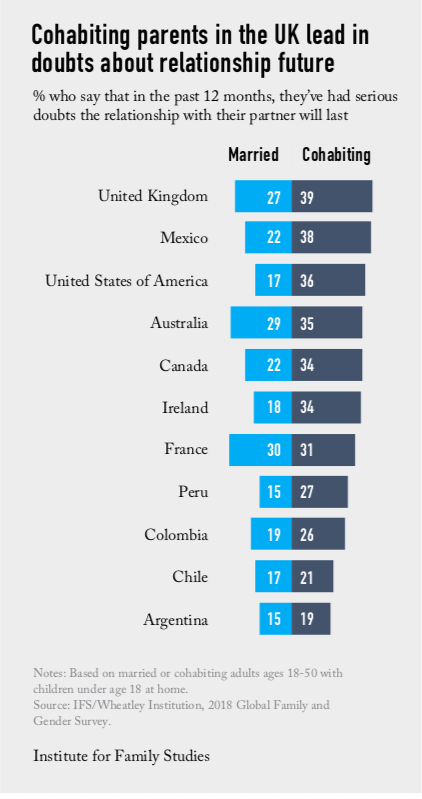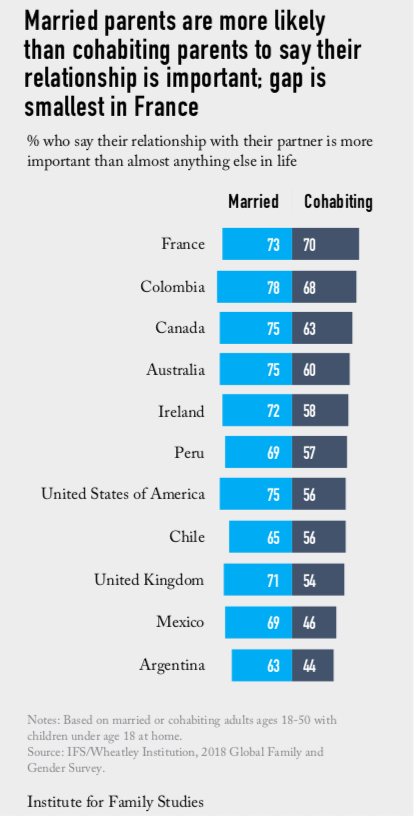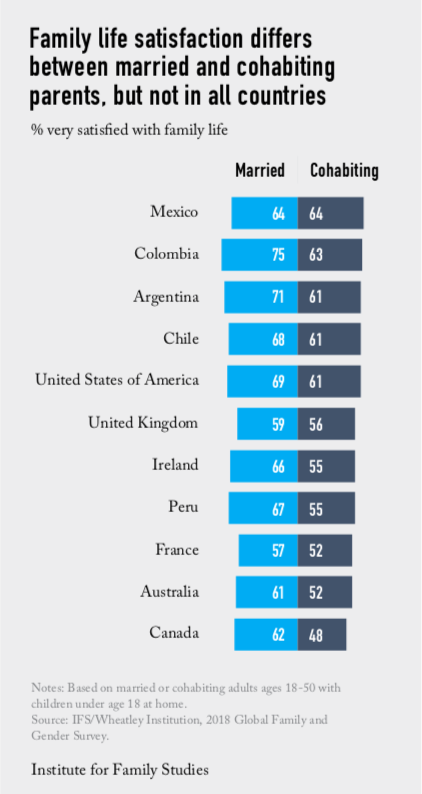Highlights
Editor's Note: A PDF version of the following report can be downloaded here.
A growing number of children in developed countries today are being raised by parents who are living together but not married. Some argue that cohabiting parents provide a family environment that is comparable to a married household, given that the children are being raised by two adults. However, a new survey of 11 developed countries shows that large shares of cohabiting couples with children under age 18 doubt that their current relationship will last, especially in comparison to married parents. Moreover, cohabiting parents in most countries are less likely than married parents to see their relationship as a vital part of their life.
Among the 11 countries surveyed, the United Kingdom tops the list of relationship doubters when it comes to cohabiting parents. About 4-in-10 UK cohabiting couples with children under age 18 in the home (39%) say that in the past 12 months, they’ve had serious doubts that their relationship with their partner will last, according to the Global Family and Gender Survey (GFGS). The corresponding share is 36% in the U.S., 35% in Australia, 34% in Canada and Ireland, and 31% in France. Across the Anglosphere, cohabitation is perceived as markedly less stable than marriage by parents.

Cohabiting parents in South America are less likely to express relationship doubts. For example, only 19% of cohabiting couples in Argentina (bottom of the list) reported that they have serious doubts about their relationship.
Nevertheless, married couples with young children in these countries generally have more confidence in their relationship than do cohabiting parents. In the UK, the share of married parents who have serious doubts about their relationship is 12 percentage points lower (27%). For U.S. parents, the difference is 19 percentage points. The smallest difference between the two groups is in France, where 30% of married parents have serious doubts about their relationship, and 31% of cohabiting parents feel the same.
In six countries (Canada, Ireland, Mexico, Peru, the UK, and the U.S.), the difference in relationship doubts between cohabiting and married couples remains significant in regression models that control for respondents’ education, age, gender, sexual orientation, economic status, and whether they are foreign born.
Fewer Cohabiting Parents Consider Their Relationship the Most Important Part of Life
In the Global Family and Gender Survey, married and cohabiting parents were also asked whether they agreed with the statement, “My relationship with my partner is more important to me than almost anything else in my life.” Overall, cohabiting parents are less likely than married parents to agree that their relationship is vital, but the difference varies across countries.
French parents stand out in this ranking of relationship importance. Seven-in-ten cohabiting parents in France believe that their relationship is more important than almost anything else in life, which is the highest share among cohabiting parents in the 11 countries. A similar share of married parents in France (73%) also consider their relationship to be an essential part of their lives.

In comparison, cohabiting and married parents in the UK differ drastically when it comes to how they value their relationship. While 71% of married parents in the country believe their relationship is more important than almost anything else in life, only 54% of cohabiting parents think this about their relationship. A similar pattern is found in Australia, Canada, the United States, and Ireland, where cohabiting parents are a lot less likely than married parents to view their relationship as a vital part of their lives.
At the bottom of the list are cohabiting parents in Argentina, where only 44% of cohabiting parents think their relationship with their partner is a vital part of their lives. The share among married parents in Argentina is much higher (63%), although it still trails married parents in the other countries surveyed.1
In almost all the surveyed countries, fathers are more likely than mothers to affirm the importance of their relationship with their partner, regardless of their marital status. For example, 65% of cohabiting dads in the UK believe their relationship is more important than anything else in life, compared with only 49% of cohabiting moms. Also in the UK, the corresponding share among married fathers is significantly higher than that of married mothers (77% vs. 66%). This pattern may reflect the fact that mothers are more likely than fathers to prioritize their children over their partner.2
Cohabiting Parents Are Less Satisfied With Family Life, But Not in All Countries
When it comes to satisfaction with family life, cohabiting parents in Mexico rank the highest among all cohabiting parents in the surveyed countries. A majority of cohabiting parents in Mexico (64%) say that they are very satisfied with family life. Interestingly, cohabiting parents are just as happy as married parents in Mexico with their family life. Cohabiting parents in other Latin American countries, such as Colombia and Argentina, also ranked higher on the list. But married parents in each of these countries reported higher family life satisfaction than cohabiting parents.
On the other hand, less than half of cohabiting parents in Canada (48%) reported high levels of family life satisfaction, and the corresponding shares are also relatively low in Australia and France.

The family satisfaction gap between cohabiting parents and married parents is small in the United Kingdom and France. Married parents in the UK and France rank lower in terms of family life satisfaction on the country list, which narrows the gap with cohabiting parents in each country. For example, only 59% of married parents in the UK are very satisfied with their family life, as are 56% of cohabiting parents.3
This report indicates that there is a large variation in how married and cohabiting parents rate their relationships across the 11 countries surveyed. In countries like France, married parents and cohabiting parents are very similar in terms of their relationship commitment and satisfaction. But especially in Anglosphere countries like Canada, the UK, the U.S., and Ireland, married parents have fewer doubts about the future of their relationship and are more committed to each other than cohabiting parents.
Children and the Cohabitation-Go-Round
In general, the findings in this Institute for Family Studies Research Brief correspond to research indicating that cohabiting families tend to be less stable for children than married families. Data from our 2017 World Family Map report indicate that children born to cohabiting parents in Europe and the United States are about 90% more likely to see their parents break up, compared to children born to married parents.4 The differences in perceived stability between married and cohabiting parents in many countries across the developed world, which are highlighted in this brief, parallel this finding.
The Global Family and Gender Survey also suggests that one factor explaining the stability premium for family life associated with marriage is commitment. Specifically, this brief finds that married parents are more likely to attach greater importance to their relationship, compared to cohabiting parents.
Differences in stability between cohabiting and married families are noteworthy because children are more likely to thrive in stable families.5 That’s because children tend to do better when their lives are marked by stable routines with stable caregivers. This brief, then, suggests that in many countries across the Americas, Europe, and Oceania, children may be more likely to experience such stability in a married family than in a cohabiting family.
Wendy Wang, Ph.D., is Director of Research of the Institute for Family Studies and a former senior researcher at Pew Research Center, where she conducted research on marriage, gender, work, and family life in the United States. W. Bradford Wilcox is Professor of Sociology at the University of Virginia, a Senior Fellow of the Institute for Family Studies, and a Visiting Scholar at the American Enterprise Institute.
References:
1. In seven countries (Argentina, Australia, Canada, Ireland, Mexico, UK, U.S.), the difference in relationship importance between cohabiting and married couples remains significant in regression models that control for respondents’ education, age, gender, sexual orientation, economic status, and whether they are foreign-born.
2. Scott Haltzman, “The Effect of Gender-Based Parental Influences on Raising Children: The Impact on Couples’ Relationships.” In W.B. Wilcox and K. Kline, Gender and Parenthood (New York: Columbia University Press, 2013).
3. In four countries (Argentina, Canada, Colombia, Ireland), the difference in family life satisfaction between cohabiting and married couples remains significant in regression models that control for respondents’ education, age, gender, sexual orientation, economic status, and whether they are foreign-born.
4. World Family Map, 2017: Mapping Family Change and Child Well-Being Outcomes (New York/Barcelona: Social Trends Institute and Institute for Family Studies, 2017).
5. Andrew J. Cherlin, The Marriage-Go-Round: The State of Marriage and the Family in America Today (New York: Knopf, 2009).
ABOUT THE DATA
Findings in this brief are based on data from the recent Institute for Family Studies/ Wheatley Institution Global Family and Gender Survey (GFGS).
The survey was conducted September 13-25, 2018, among adults ages 18 to 50 in 11 countries: Argentina, Australia, Canada, Chile, Colombia, France, Ireland, Mexico, Peru, the United Kingdom, and the United States of America.
Survey interviews were conducted online in English, Spanish, French, and Quebecois languages (depending on the languages used in each country) under the direction of Ipsos Public Affairs (formerly GfK). A combination of samples from the KnowledgePanel and Opt-in panels were used in the survey. The U.S. sample was from Ipsos’s KnowledgePanel, a probability-based web panel that is representative of the U.S. population. Samples in other countries were selected from Toluna’s Opt-in panels.
A total of 16,474 interviews were completed. Sample sizes for each country are as follows: Argentina 668, Australia 2420, Canada 2200, Chile 1240, Colombia 620, France 1215, Ireland 2420, Mexico 677, Peru 645, United Kingdom 2344, United States of America 2025.
Data are weighted to produce a final sample that is representative of the population ages 18 to 50 in the United States. For other countries, the sample is weighted to match the distributions of age, gender, education, and region of the population ages 18 to 50 in each country.
Lesbian, gay, bisexual and transgender (LGBT) adults are included but are not analyzed separately. Children in this analysis refer to biological, adopted, or step-children of respondents.














